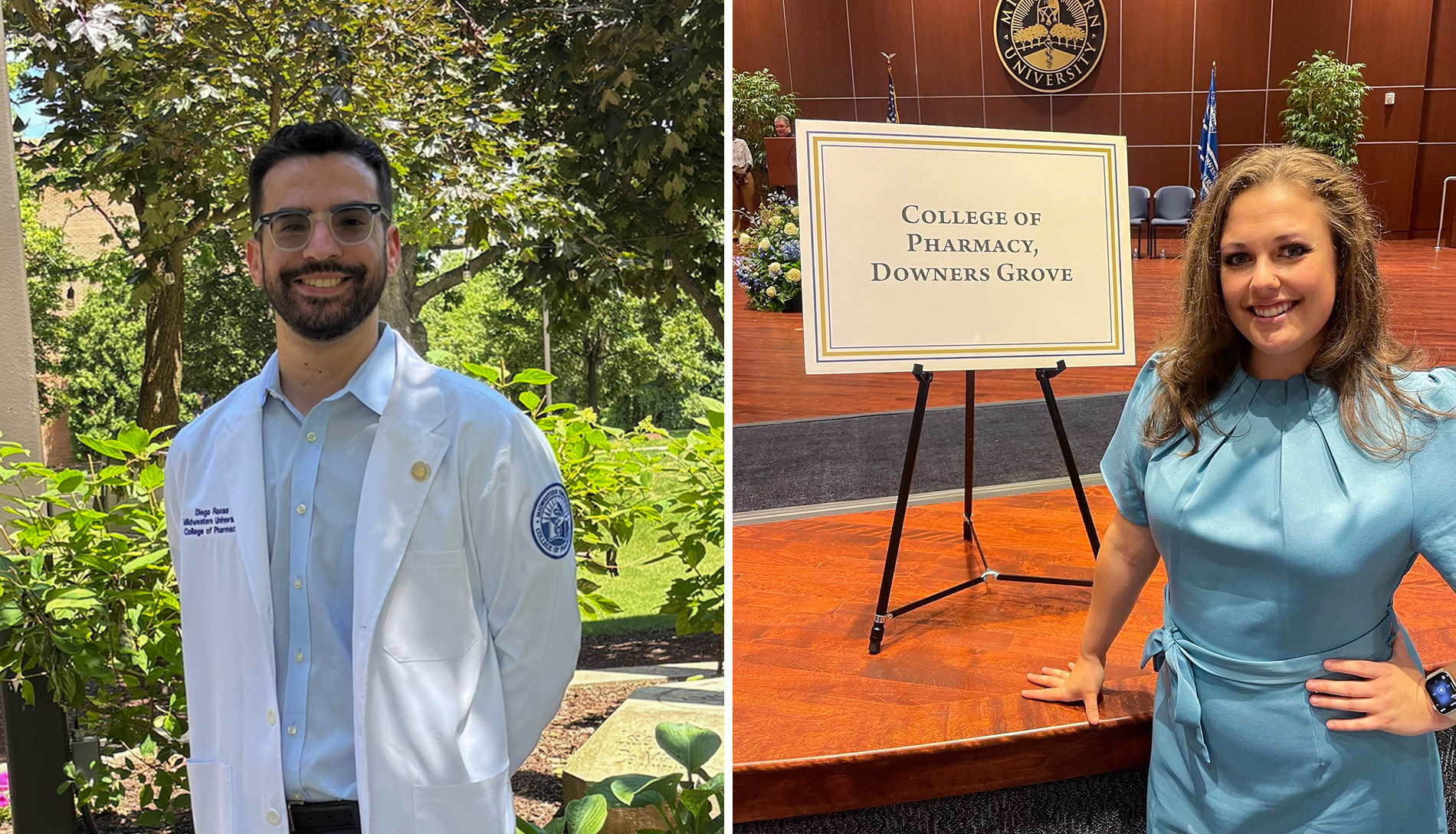Hands-on training and clinical experience prepare students to respond with skill, confidence, and compassion
Two students from Midwestern University’s College of Pharmacy, Downers Grove (CPDG), demonstrated quick thinking, compassion, and clinical training in high-pressure situations, helping to save lives while still in graduate school. Kanon Huffman (CPDG ’26) performed chest compressions to revive a person in cardiac arrest. And, Diego Gonzales Rosso (CPDG ’26) administered Narcan to assist an individual in crisis. They both took decisive action when every second counted.
Their stories highlight the critical role of pharmacists in patient care and the way Midwestern’s curriculum prepares students to lead with knowledge, professionalism, and care.
During her Introductory Pharmacy Practice Experience (IPPE) at Rush University Medical Center, Midwestern University College of Pharmacy student Kanon Huffman (CPDG ’26) sprang into action when she saw a patient in distress. Drawing on both her past experience working with dialysis patients and recent emergency response training at Midwestern, Kanon quickly assessed the patient and recognized signs of cardiac arrest, including agonal breathing and lack of a pulse. She immediately began chest compressions until the patient regained a pulse.
“I had just renewed my Basic Life Support (BLS) training through Midwestern. We are required to do full BLS certification before going on rotations,” she said. “In class, we talk a lot about the fear of freezing in an emergency. But when you’re actually in the moment, your training kicks in. Even if you can’t do everything, you know the bare minimum. You keep the heart beating. Every minute matters, not just for brain function, but for heart muscle, too.”
Kanon credits her pharmacy education for giving her the clinical reasoning skills and emergency training that helped her stay calm and focused in a crisis. “It’s nice to know that I am able to bring up that background knowledge from classes and from didactic learning and see how it’s implicated on a person,” she said.
Kanon has since developed a deeper interest in cardiology and is preparing for a related clinical rotation. “People don’t always realize how much pharmacists are trained to do,” she said. “We’re often the first line of healthcare for a lot of people, especially in rural communities, and sometimes we’re the last check to make sure someone is safe.”
While visiting his hometown of San Juan, Puerto Rico, during spring break, Diego Rosso Gonzalez (CPDG ’26) acted decisively when he saw a woman collapse outside a crowded bar in the city’s vibrant Old San Juan district. “She had pinpoint pupils, so I pretty much noticed, OK, this may be something she took or she was laced with something,” he said.
Trained through Midwestern’s American Pharmacists Association (APhA) Substance Use Disorder program, Diego recognized the signs of an opioid overdose and administered naloxone, which he always carries. “I pretty much took action, gave her the doses of naloxone, did the typical steps that I was trained for here at Midwestern. She responded after the treatment, and I waited for the ambulance to come by.”
For Diego, the experience was an affirmation of his training and calling. “It gave me the sense that I was applying what I learned in a real-life scenario. I didn’t think twice. It was pretty much muscle memory,” he said. “This experience taught me that pharmacists… can save lives efficiently. All these hours of education, of training, hard work, it is a benefit, not only in our day-to-day, but for the people we’re serving.” Now preparing for his final rotations, Diego says his passion for patient care is stronger than ever. “I always carry my Narcan. I have two with me always, just in case,” he said.
Midwestern has played a key role in shaping Diego’s confidence and skills as a future pharmacist. “Coming from another country, cultural differences—it was all new to me,” he said. “But I always felt supported by the faculty. They opened so many doors.” From volunteering through the American Pharmacists Association to working with underserved patients at the Bolingbrook Christian Health Center, Diego has found purpose in service. “I’ve grown from being a quiet person who moved here two years ago to someone who’s developed leadership skills I’m proud of. Midwestern gave me that opportunity.”
“At Midwestern University College of Pharmacy, we emphasize that students are already leaders, regardless of their degree or title. As part of our Introductory Pharmacy Practice Experiences, pharmacy students are embedded into health-care systems the summer after their first year. While this may seem intimidating, we find students rise to the challenge of the professional expectations. This not only includes contributing to the operations of the pharmacy, but also asking good questions, staying curious, listening, and treating everyone on the healthcare team with respect – including the patient,” said Brooke Griffin, Pharm.D., Vice Chair, Pharmacy Practice, College of Pharmacy, Downers Grove. “In healthcare, we have to be as prepared as possible for the unexpected and in both Kanon’s and Diego’s situations, they rose to the occasion and offered help immediately. When our students wear their white coats in the various hospitals and clinics, they are proudly displaying the Midwestern seal on the patch while also displaying the professionalism that honors that seal.”
These powerful moments, whether in a hospital setting or on a busy street, reflect how Midwestern University students are prepared to respond with knowledge, confidence, and care when lives are on the line. For Kanon and Diego, their stories are not just about quick action; they’re about becoming the kind of healthcare professionals who make a difference when it matters most. “It really solidified that I’m doing what I’m supposed to be doing,” Kanon said. “All of the hard work, all of the studying, all of the times I stayed home to prepare instead of going out… It’s worth it, because I got to give somebody their mom back.”
About Midwestern University
Midwestern University is a private, not-for-profit graduate and postgraduate institution specializing in the health sciences. The University serves more than 6,800 students across two campuses. The 105-acre Downers Grove Campus in Illinois includes seven colleges: the Chicago College of Osteopathic Medicine; the College of Pharmacy, Downers Grove; the College of Health Sciences–Downers Grove Campus; the College of Dental Medicine–Illinois; the Chicago College of Optometry; the Proposed College of Veterinary Medicine–Illinois; and the College of Graduate Studies. The University also operates an 11-acre clinical campus that includes the Midwestern University Multispecialty Clinic and the future Companion Animal Clinic. The 134-acre Glendale Campus in Arizona includes eight colleges: the Arizona College of Osteopathic Medicine; the College of Pharmacy, Glendale; the College of Health Sciences–Glendale Campus; the College of Dental Medicine–Arizona; the Arizona College of Optometry; the College of Veterinary Medicine-Arizona; the College of Graduate Studies; and the Arizona College of Podiatric Medicine. The campus also features five community clinics on a 40-acre clinical campus: the Midwestern University Multispecialty Clinic, Dental Institute, Eye Institute, Animal Health Institute, and Therapy Institute.
Midwestern University is accredited by the Higher Learning Commission, a Commission of the North Central Association of Colleges and Schools. For more information, visit https://www.midwestern.edu or call (630) 515-7333. To learn more about Midwestern University Clinics, visit https://www.mwuclinics.com.

